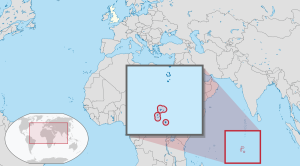Is the sun about to set on Britain’s control of the Chagos Islands? This remote archipelago of around 60 islands can be found halfway between East Africa and Southeast Asia. The Chagos group is governed by London as the British Indian Ocean Territory (BIOT), one of 14 claimed Overseas Territories that constitute the remnants of the British Empire. Most of the international community, however, regards the Chagos Archipelago as belonging to Mauritius.
Today, Britain and Mauritius are in talks over the fate of the islands. Also at stake is the future of the indigenous population, the Chagossians, who were expelled from their homes in the 1960s and 1970s in advance of the construction of a U.S. military base on the largest island of Diego Garcia. For decades, Britain has blocked the Chagossians from returning to their islands. Under Mauritian sovereignty, resettlement might be possible.
The decision for Britain to exit the Chagos Archipelago should be straightforward. A convincing majority of the international community has spoken that Diego Garcia and the rest of the Chagos Archipelago belong to Mauritius, not the United Kingdom. Early last year, the case for Mauritian sovereignty was even etched into international case law. Simply put, London’s administration of the Chagos Islands is illegal. It cannot be allowed to persist.
There is one issue, however, that threatens to derail negotiations and disrupt the case for decolonization: The suggestion that China is poised to build a military base in the Chagos Archipelago once the islands have been returned to Mauritian control. One version of this argument is that Mauritius intends to eject the United States from Diego Garcia and invite China to fill its place. Another version is that China might militarize one of the other islands of the Chagos group.
The allegations are being pushed most vociferously by Daniel Kawczynski, a Conservative Party member of the U.K. Parliament. In a recent article for the Daily Mail, Kawczynski was quoted extensively on these points. While he did not provide any evidence that Beijing was planning to establish a military presence in the Chagos Islands, Kawczynski was emphatic. “The Chinese will in two minutes flat take control,” he insisted.
Kawczynski later arranged a parliamentary debate on the question of the Chagos Islands, using his allotted time to criticize the government’s decision to negotiate with Mauritius. Again, fears about Chinese expansionism featured prominently.
Such efforts ensured that worldwide news outlets – especially in India and the United States – picked up the story. In recent weeks, it has been repeated by several different outlets that Mauritius and China might be in cahoots. It is at least possible that these rumors will complicate or even thwart the move toward decolonization.
Is there any truth to the accusation that China plans to establish a military presence in the Chagos Islands? The answer is simple: No.
Kawczynski first made his allegations about Chinese designs on the Chagos Islands around 18 months ago. He did not then – and has not since – produce any evidence whatsoever to support his claims. Nor has anyone else.
This point cannot be made strongly enough: There is simply no evidence to support Kawczynski’s assertions about China’s military plans. Nor is there any reason to believe that Mauritius would want to host a Chinese military installation. The accusations are entirely baseless.
Indeed, it is fanciful to suggest that Mauritius intends to host a Chinese base when, on the contrary, the Mauritian government has offered the United States a 99-year lease on Diego Garcia. This is a credible offer consistent with longstanding cooperation between the United States, Britain, and Mauritius on maritime security issues.
To clear up any remaining doubt, none of the smaller Chagos Islands are suitable for hosting military installations, which is perhaps why they have never been militarized by Britain or the United States. These tiny islets are much too small for such purposes.
To be sure, there are reports of an Indian military base being built on Agalega, another Mauritian territory in the Western Indian Ocean. But this only highlights the extent to which Mauritius is closely aligned with India – another security partner of the United States and a member of the anti-China Quad grouping. There has never been any suggestion of a Chinese military base being built on Mauritian soil.
Kawczynski has cited the recent free trade agreement between Mauritius and China as proof that Mauritius is now within Beijing’s sphere of influence. But this is a specious argument. Mauritius does import large quantities of goods from China, as do other countries, but its biggest export markets remain South Africa, France, the United Kingdom, and United States.
In any case, it is obviously possible to have a free trade agreement with China while remaining firmly aligned with the United States on security issues. Just ask Australia, Iceland, New Zealand, or Singapore – all close partners of Washington who have concluded trade deals with Beijing.
The irony is that Kawczynski’s plea for Britain and the United States to continue ignoring international law would only encourage Indo-Pacific nations like Mauritius into China’s orbit. To be clear, Kawczynski is explicitly and unabashedly urging his government to act in an imperial manner. Even if this argument plays well among those nostalgic for the British Empire, it is entirely out of step with how most serious people today think about international politics.
British and American leaders would do well to ignore Kawczynski’s advice. They should instead pursue a resolution of the Chagos dispute that upholds the rules-based international order, enables the Chagossians to return to the islands, and places Mauritius at the heart of the incipient U.S.-led security framework in the Indian Ocean that also includes Britain, India, France, and Australia, among others.
































